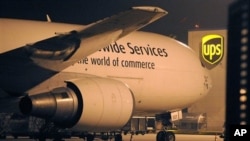European countries including Britain and Germany have tightened air security measures amid fears about the safety of cargo.
Britain's Home Secretary Theresa May announced new aviation security measures Monday.
"From midnight tonight we will extend the suspension of unaccompanied air freight to this country, not just from Yemen but also Somalia," May said.
On Friday, authorities in Britain and the United Arab Emirates discovered two packages carrying the powerful explosive PETN. They had been sent from Yemen and were addressed to synagogues in the United States. The package found in Britain had already passed through Dubai and Germany.
Related video report by Henry Ridgwell:
Monday, Qatar Airways said another bomb, which was intercepted in Dubai, had traveled as cargo on two passenger flights before being discovered.
British Home Secretary May said the new aviation restrictions will be reviewed in the coming weeks.
"It is based on possible contact between al-Qaida in Yemen and terrorist groups in Somalia, as well as concern about airport security in Mogadishu," May said.
Britain is not the only country to introduce new aviation security following the bomb scare. France and the Netherlands have also banned cargo flights originating from Yemen. Germany has gone a step further and banned all incoming flights from Yemen.
A Yemen official told the country's state-run news agency that Germany's decision was a "collective punishment" against the people of Yemen.
Britain-based security expert Norman Shanks says air cargo has long been a vulnerable point in aviation security.
"Those of us in the industry were aware of it and it does not take too long for the terrorists to identify those emissions or those loopholes and that is exactly what they have done," Shanks said.
He says technology exists that would have identified the explosives - the same technology, he says, that is used for checked-baggage screening. He says cargo should go through the same security.
Banning all cargo that arrives from Yemen or Somalia, he says, is not the answer.
"The terrorist simply has to take their packages across to another country, they do not need to do that by air," Shanks said. "And then ship them out through what is regarded as a potentially safe country."
Earlier this year, the United States introduced a requirement that all cargo loaded onto passenger planes be screened for explosives. But rules on cargo screening vary around the world.
